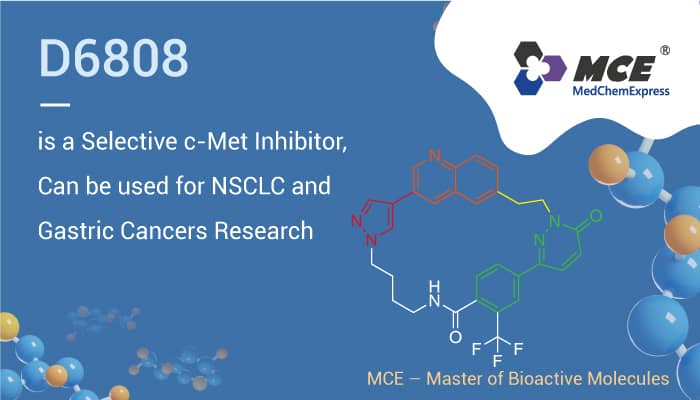c-Met is a unique subfamily member of receptor tyrosine kinase (RTK) behaving as the receptor of hepatocyte growth factor (HGF)/scatter factor (SF). The HGF/c-Met signaling pathway plays important roles in a variety of biological activities. However, aberrant HGF/c-Met signaling is associated with the induction of a multitude of human malignancies through varieties of molecular mechanisms including MET gene amplification, mutations, overexpression, and rearrangement. Moreover, MET alterations have been validated as a driving factor in NSCLC and gastric cancers. Here, we will introduce a c‑Met inhibitor, D6808.
D6808 is a highly selective and potent c‑Met inhibitor (IC50 = 2.9 nM)

In vitro, D6808 (0.0001-10 μM; 5 d) shows cellular antiproliferative potency to Hs746T cancer cells with an IC50 value of 0.7 nM. D6808 (40 nM; 24 h) also induces cell apoptosis and 87.37% G0/G1 phase arrest in Ba/F3-Tpr-Met cells. Moreover, D6808 (0-30 nM; 12 h) affects the activation of MET and dose-dependently decreases the protein levels of CDK2, CDK4, CDK6, cyclin D2, and cyclin E1, and the cleave activation of PARP and caspase-9 in Ba/F3-Tpr-Met cells.
More excited, D6808 also strongly suppresses Ba/F3-Tpr-Met cells harboring resistance-relevant mutations (F1200L/M1250T/H1094Y/F1200I/L1195V) with IC50 values of 4.2, 3.2, 1.0, 39.0, and 33.4 nM, respectively. Furthermore, D6808 exhibits extraordinary target specificity in Kinome profiling against 373 wild-type kinases.
In vivo, D6808 (10 mg/kg; i.p.; single; Sprague-Dawley rats) exhibits good parameters with a plasma exposure AUC0-t value of 820.38 h × ng/mL and a Cmax value of 282.12 ng/mL and a reasonable half-life with a T1/2 value of 4.63 h.
As a highly selective macrocyclic c-Met inhibitor, D6808 is hopeful for research of gastric cancer harboring MET gene alteration.
Reference:
[1] Wang C, et al. J Med Chem. 2022 Nov 24;65(22):15140-15164.